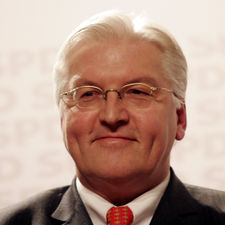Frank-Walter Steinmeier
| Frank-Walter Steinmeier | |
 |
|
|
Vice Chancellor of Germany
|
|
| In office 21 November 2007 – 27 October 2009 |
|
| Preceded by | Franz Müntefering |
|---|---|
| Succeeded by | Guido Westerwelle |
|
Minister of Foreign Affairs of Germany
|
|
| In office 22 November 2005 – 27 October 2009 |
|
| Preceded by | Joschka Fischer |
| Succeeded by | Guido Westerwelle |
|
|
|
| Born | 5 January 1956 Detmold, West Germany |
| Nationality | German |
| Political party | Social Democratic Party of Germany (SPD) |
| Alma mater | University of Giessen |
| Religion | Evangelical Church in Germany[1] |
Frank-Walter Steinmeier (born 5 January 1956) is a German politician of the Social Democratic Party of Germany (SPD), and currently the leader of the opposition in the Bundestag. Steinmeier was a close aide of former Chancellor Gerhard Schröder, serving as Chief of Staff in the German Chancellery from 1999 to 2005. He subsequently served as Foreign Minister (2005-2009) and Vice Chancellor (2007-2009) in the grand coalition government of Angela Merkel. In 2008, he briefly served as acting chairman of his party.
Contents |
Early life
Steinmeier was born in Detmold. Following his Abitur, he served his military service from 1974 until 1976. He then studied law and political science at the Justus-Liebig-Universität of Gießen. In 1982 he passed his first and 1986 his second state examination in law. He worked as scientific assistant to the professor of public law and political science at the Gießen university, until he obtained his doctorate of law in 1991.
Steinmeier is married and has one daughter.
Political career
Steinmeier became an adviser in 1991 for law of communication media and media guidelines in the state Chancellery of Lower Saxony in Hanover. In 1993, he became director of the personal office for the then Prime Minister of Lower Saxony, Gerhard Schröder. In 1996, he became the Undersecretary of State and Director of the State Chancellery of Lower Saxony.
Steinmeier was appointed in November 1998 as Undersecretary of State in the Office of the Chancellor following Schröder's election victory. He replaced Bodo Hombach as the head of the Office of the Chancellor in 1999. Because of his effective management beyond the spotlight of politics, he was nick-named Die Graue Effizienz (The Grey Efficiency) - a pun on Graue Eminenz, the German for éminence grise.
Foreign minister
On 22 November 2005, he became Foreign Minister of Germany in the Grand coalition cabinet formed by Angela Merkel. Steinmeier was the first SPD Foreign Minister since Willy Brandt (1966-1969).
Following Franz Müntefering's departure from the cabinet on 21 November 2007, Steinmeier also filled the position of Vice-Chancellor.[2]
In 2007, Steienmeier said he opposes European Commission proposals on unbundling the ownership of energy networks in the European Union.[3]
Russian opposition activists celebrated when Steinmeier lost elections in 2009, signaling their discontent with Steinmeier. Oleg Orlov, head of the Memorial human rights group, said that Steinmeier had prolonged Schröder's policies on Russia and that Germany's policies were "extremely bad for civil society, democracy and the country as a whole".[4]
In 2008, Steinmeier refused to meet Dalai Lama. Instead, Steienmeier issued the statement "it takes a lot of courage not to meet with the Dalai Lama these days", which the New York Times described as "extraordinary cynical" and accused of Steinmeier of prioritizing money over human rights.[5][6][7]
Steinmeier served as acting chairman of the SPD from 7 September 2008 to 18 October 2008.
2009 elections
On 7 September 2008, following the resignation of SPD chairman Kurt Beck, Steinmeier was chosen as the SPD front-runner for the 2009 federal elections and also designated as acting SPD Chairman, pending the return of Müntefering to that position.[8]
After the SPD's decisive defeat in the elections[9], Steinmeier was elected as chairman of the SPD's parliamentary group in the Bundestag, and as such leader of the opposition.[10]
References
- ↑ Thüringer Allgemeine, retrieved 2008-12-06.
- ↑ Andreas Cremer and Brian Parkin, "Muentefering, Vice-Chancellor Under Merkel, Quits", Bloomberg.com, November 13, 2007.
- ↑ German minister opposes EU utility unbundling idea Reuters Jan 20, 2007
- ↑ German Vote Raises Hopes in Russia. Moscow Times. 29 September 2009.
- ↑ Steinmeier's bad example New York Times May 20, 2008
- ↑ German Minister Criticized for Planned Meeting with Dalai Lama. Spiegel Online International. 05/17/2008
- ↑ Dalai Lama `Disappointed' Germany's Steinmeier Won't Meet Him Bloomberg May 9, 2008
- ↑ "German SPD party reshuffles leadership, with eye on election", Xinhua, September 7, 2008.
- ↑ http://www.telegraph.co.uk/news/worldnews/europe/germany/6237210/Merkels-rival-concedes-defeat-in-German-election.html
- ↑ http://www.zeit.de/politik/deutschland/2009-09/spd-steinmeier-opposition
External links
 Media related to Frank-Walter Steinmeier at Wikimedia Commons
Media related to Frank-Walter Steinmeier at Wikimedia Commons- (German) Steinmeier's campaign website for the 2009 general election in Germany
| Political offices | ||
|---|---|---|
| Preceded by Bodo Hombach |
Chief of the Chancellery 1999–2005 |
Succeeded by Thomas de Maizière |
| Preceded by Joschka Fischer |
Foreign Minister of Germany 2005–2009 |
Succeeded by Guido Westerwelle |
| Preceded by Franz Müntefering |
Vice Chancellor of Germany 2007–2009 |
Succeeded by Guido Westerwelle |
|
|||||||
|
|||||||||||||||||
|
|||||||